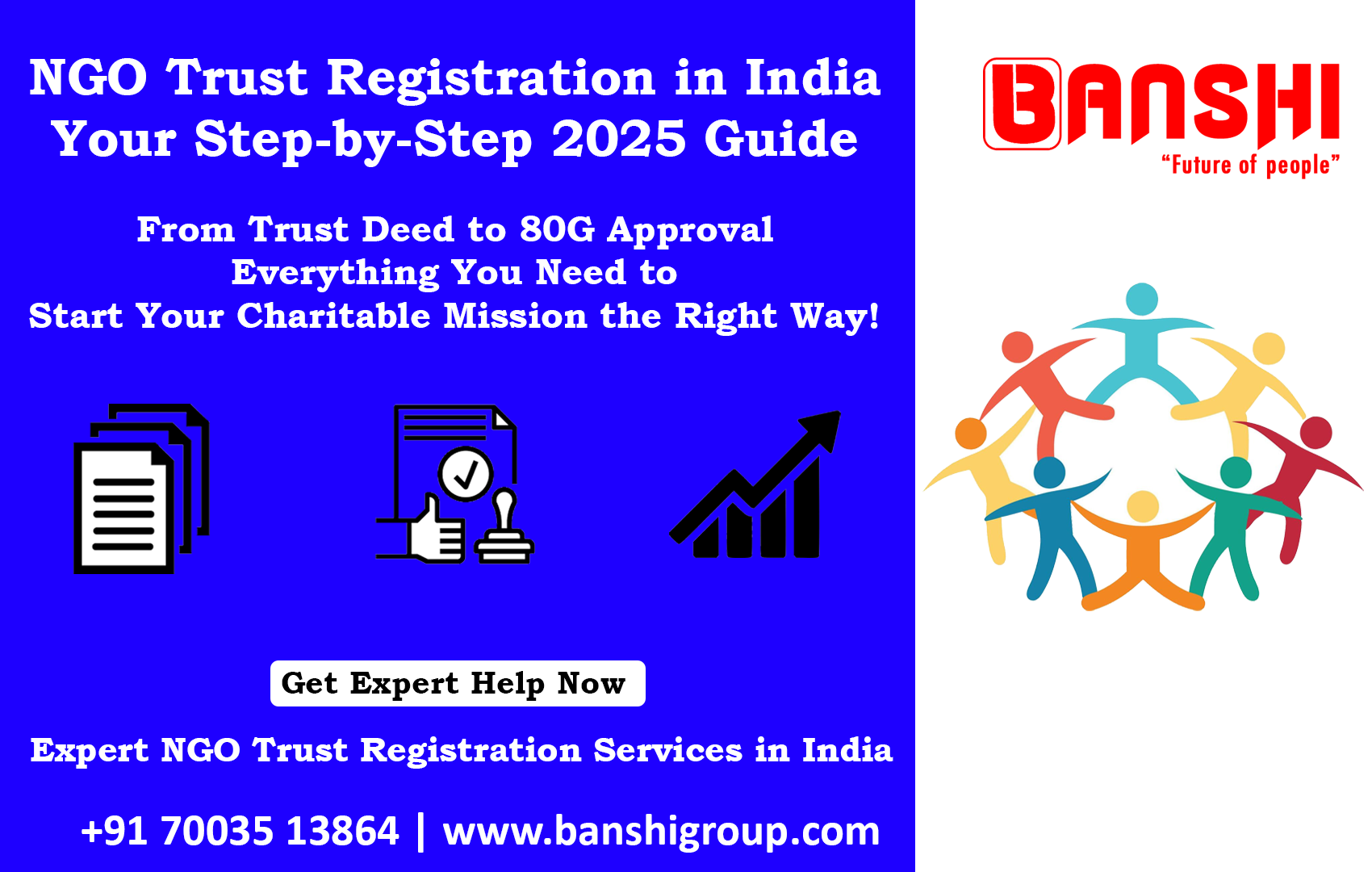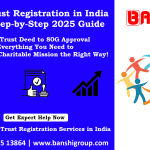Introduction for NGO trust registration
Starting a Non-Governmental Organization (NGO) is like deciding to be the superhero of your community—minus the cape (unless you really want to wear one). Among the various legal structures available for NGOs in India, registering as a Trust is one of the most popular and time-tested options.
If you’re planning to set up a charitable, social welfare, religious, or educational organization, understanding the NGO Trust registration process in India is absolutely crucial. This guide will take you through the meaning, benefits, eligibility, documents, process, compliance —all with clarity and a pinch of humor so it doesn’t feel like you’re reading a boring legal manual.
Understanding What a Trust Is
A Trust is a legal arrangement where one or more people (Settlors) hand over assets or property to another person or group (Trustees) to manage for the benefit of the public or a specific community.
Private Trusts → Governed by the Indian Trusts Act, 1882 (mostly for family or personal benefit).
Public Charitable Trusts → Governed by state-specific Public Trust Acts and created for charitable or religious purposes.
📌 Simple Analogy: Think of a Trust as a “mission bank” where you deposit your good intentions, and trustees use those deposits to create social impact.
Why Register an NGO as a Trust?
While you can technically run an unregistered trust, registration unlocks major advantages that make it worth the paperwork.
- Legal Recognition – Your trust becomes an official entity.
- Tax Benefits – Eligible for 12A & 80G
- Credibility Boost – Helps attract donors, CSR funds, and government grants.
- Perpetual Existence – Continues even if trustees change.
- FCRA Eligibility – Can legally receive foreign donations.
- 📊 Data Insight: As per NGO Darpan (NITI Aayog) records, around 3.1 lakh registered NGOs in India operate as public charitable trusts, making it the most preferred form after societies.
Eligibility for Trust Registration
Before you run to the Sub-Registrar office, check these:
- Minimum Members – 2 trustees (some states require 3).
- Purpose – Must be charitable, religious, educational, or social welfare.
- Settlor – Any individual or corporate entity can create a trust.
- Property – Can be movable (cash, gold) or immovable (land, building).
- 💡 State Alert: Maharashtra, Gujarat, and Rajasthan have slightly different processes under their Public Trusts Acts.
Documents Required for Trust Registration
Here’s your registration checklist:
- Trust Deed (on stamp paper as per state value).
- ID Proof – Aadhaar, Voter ID, Passport, or Driving License of all parties.
- Address Proof – Electricity bill, rent agreement, or ownership proof.
- PAN Cards – For settlor and trustees.
- Passport-size photographs.
- NOC from property owner (if rented).
Step-by-Step Process for NGO Trust Registration
Step 1: Choose a Unique Name
- Avoid prohibited names under the Emblems & Names Act, 1950.
- Make sure it’s not already taken by another NGO.
Step 2: Draft the Trust Deed
- Must include objectives, trustee powers, and beneficiary details.
- Ensure clauses for replacement/removal of trustees.
Step 3: Collect Documents
Self-attested ID proofs, photos, and office address proof.
Step 4: Pay Stamp Duty
Value differs per state (₹100–₹1,000+).
Step 5: Register the Trust Deed
- Visit the Sub-Registrar office with all trustees present.
- Biometric verification may be required.
Step 6: Get the Registration Certificate
Official proof that your trust is recognized.
Step 7: Apply for PAN & Bank Account
Mandatory for financial operations.
Step 8: Apply for 12A & 80G
- 12A → Tax exemption for the trust.
- 80G → Donors get tax benefits.
Step 9: Optional CSR & FCRA Registration
- CSR → To receive corporate donations.
- FCRA → For foreign funding.
📌 Average Timeline: 10–15 working days for registration. 1–2 months for 12A/80G.
Benefits of Registering Your NGO as a Trust
- Access to government and private funding.
- Donor confidence with tax benefits.
- Legal protection for trustees.
- Lifelong existence of the organization.
- Easier compliance compared to other NGO structures.
Post-Registration Compliance for Trusts
- Maintain accounts and supporting vouchers.
- Annual audit by a CA.
- File ITR every year.
- Renew 12A/80G before expiry.
- Follow state-specific trust laws.
⚠ Common Penalty: Non-filing of returns can attract fines up to ₹25,000.
Common Mistakes to Avoid
- Using a name that violates trademark or law.
- Missing NOC for rented property.
- Drafting an incomplete trust deed.
- Forgetting 12A/80G application after registration.
Cost of Trust Registration in India
- Stamp Duty: ₹100–₹1,000+
- Professional Fees: ₹3,000–₹10,000
- Total: ₹5,000–₹15,000 on average.
Key Statistics on NGOs in India
- 1 lakh – Registered charitable trusts in India (as per NGO Darpan).
- 60% – Prefer trusts over societies and Section 8 companies due to simpler compliance.
- 80G – NGOs with this certification raise 45% more from individual donors.
- FCRA Funding – ₹22,000+ crore received by registered NGOs in FY 2022-23.
Registering an NGO as a Trust in India is like planting a tree—you may not see all the benefits immediately, but over time it becomes a shelter for many. The process might seem technical, but with expert help, it’s straightforward.
At Banshi Group, we provide end-to-end NGO trust registration services, including trust deed drafting, registration, and 12A/80G, CSR, and FCRA approvals.
📞 Phone: +91 7003513864
📧 Email: info@banshigroup.com
🏢 Office: First Floor, SDF Building, 211, Banshi, GP Block, Sector V, Bidhannagar, Kolkata, West Bengal 700091
Frequently Asked Questions (FAQ) on NGO Trust Registration in India
1. What is the minimum number of members required to register a trust?
A minimum of two trustees are required to register a public charitable trust. However, some states may require at least three trustees.
2. Can a single person register an NGO as a trust?
No. At least two individuals (a settlor and one trustee) are needed. A trust cannot be formed by a single person.
3. How long does it take to register a trust in India?
The registration process usually takes 10–15 working days, depending on the state and the Sub-Registrar’s office.
4. Is PAN mandatory for trust registration?
Yes. PAN of the settlor and trustees is required at the time of trust registration. After registration, a separate PAN card must be obtained in the name of the trust.
5. What is the cost of registering a trust in India?
The cost varies by state due to stamp duty differences. Typically, it ranges between ₹5,000 to ₹15,000, including professional charges.
6. Can a trust receive donations?
Yes. Once registered, a trust can receive donations from individuals and organizations. To provide tax benefits to donors, the trust must obtain 12A & 80G registration from the Income Tax Department.
7. Can a trust receive foreign contributions?
Yes, but only after obtaining FCRA (Foreign Contribution Regulation Act) registration from the Ministry of Home Affairs.
8. Can I register a trust from a rented property?
Yes. You can register a trust from a rented property by providing a No Objection Certificate (NOC) from the property owner.
9. Is it mandatory to register a trust?
While an unregistered trust can function, registration is strongly recommended as it provides legal recognition, better credibility, and eligibility for tax exemptions and grants.
10. What are the post-registration compliances for a trust?
- Maintain proper accounts and records
- Annual audit by a Chartered Accountant
- File income tax returns
- Renew 12A/80G certificates when due








Leave a Reply